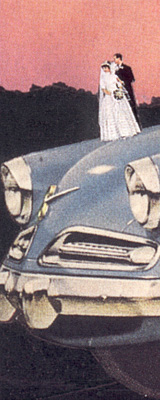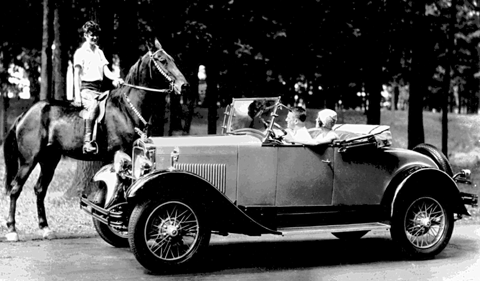“Do you mind?” she asked when they were back at home.
“Mind?” said Herb. “Mind! I’m overwhelmed! Overwhelmed with joy, I mean.”
Overwhelmed, she thought. Overwhelmed by the idea of three of us living in this room?
“Do you—do you mind?” Herb asked. He wondered whether her question was a way of asking whether he agreed that they’d be cramped with a baby.
“Oh, Herb,” she said, “I love it. Her. I love her already.”
“Her? You’re sure?”
“I have a hunch.”
“You won’t feel cramped here, Lorna?”
“Not if you won’t.”
“I won’t if you won’t.”
“You will, won’t you?”
“No! Oh, no. Not if you won’t.”
“Are you being honest with me, Herb?”
“I am. I am. You’re the one who isn’t.”
“You want to move, don’t you?”
“No! I don’t want to move. I think you want to move.”
“And I think you want to move.”
“All right, let’s move.”
“Fine! If that’s what you want, let’s move.”
“It isn’t what I want! It’s what you want. Why don’t you just admit it?”
“I will not admit anything of the kind. You’re doing this because you want to move.”
“Lorna, I’m doing this for you.”
“I don’t want you to do it for me. I don’t want you to do anything for me. Not like this. I don’t want you giving anything up for me. Or for Ella.”
“Ella?”
“Ella.”
“Ella. Hm. Ella.”
“Do you like it?”
“I—”
“You don’t like it.”
“I do. I do like it. Ella Piper. It’s easy to say—that’s important. People remember your name if it’s easy to say, if it’s catchy. Ella Piper. It’s not short for anything, is it?”
“Cinderella.”
“You’re not going to call her—”
“No, no. Of course not. She’ll never even know. Only you and I will.”
A pause.
“You—you do want to move, don’t you?” said Herb.
“You want to move!”
“Only if you do.”
AND SO they decided to move. Lorna wanted to tell Mrs. Mikszath
herself, when they were alone. She invited her for coffee, sat her
down, and fussed over her, putting a pillow behind the small of her back,
insisting that she kick off her shoes and put her feet on the ottoman,
buttering a roll for her, putting a third lump of sugar in her coffee.
And then, when she thought that the pillow and ottoman and buttered roll
and extra sugar had provided enough of a cushion, she delivered the blow:
“Mrs. Mikszath,” she said, looking into her cup, “Herb and I are going
to move. We don’t want to go, but we have to have more room for the
baby, for Ella.”
Mrs. Mikszath said nothing. She stirred her
coffee. She looked at the roll. She put her spoon on the saucer.
She sighed. “I’m sorry,” she said. A tear fell from her right
eye, struck her cheek, ran along a wrinkle. “I wish you wouldn’t
go.”
“Oh, so do I, Mrs. Mikszath. We’ve really
liked it here, really. We just—”
“Miklos and I—”
“We need more room.”
“Miklos and I, we, we are in the way.”
“In the way?”
“You have to go past us. In the living room.
When we—we’re in the living room—you have to go by us. We hear you,
at night. On tiptoes. You don’t feel at home.”
“Oh, no. No, Mrs. Mikszath. That’s not
it. We do feel at home. It’s just the space. That’s all.”
“Maybe Miklos and I could move in here!”
“What?”
“Sure! We could move in here. You and
Herb move in our place. Living room, regular kitchen, whole big bathroom,
bedroom, plenty of room. What do we need, anyway?” She looked
around. Her shoulders dropped. She frowned and shook her head.
“No,” she said. “Miklos wouldn’t stand it. It’s too small.
It would make him feel bad to be in just one room.” She smiled at
Lorna, a weak smile, as if the idea had been Lorna’s and she was sorry
to have to disappoint her. “I can’t make him feel bad,” she said.
“Of course not,” said Lorna.
Mrs. Mikszath touched the handle of her cup as if
she were going to lift it and drink from it, but she paused, thought, made
a frail fist, nodded once, and raised her head to look at Lorna.
There was mischief in her eyes. “So,” she said. “In this case,
I want to tell you. Something I have to say. A secret, you
understand?”
“Yes. A secret.”
“A secret for women, okay?”
“Okay.”
“At night, Miklos and I, we hear you. Always,
you and Herb, we hear you.”
Lorna looked puzzled. “I’m sorry if we—”
“Oh, no, no. I mean we hear you—” She
nodded toward the pine bed. “—in bed.”
“You do?”
“From the first night!” She clapped her hands.
“We try not to listen. I wash the dishes, make noise, but we can’t
help it. You are—very busy in bed.”
“Mrs. Mikszath!”
“You are, you are, very—alive! Bouncing.
Giggling. Squealing. Sounds very good, very nice. We
try not to listen, but we can’t help hearing, and I tell you, most things
we don’t hear so well. Finally, we give up trying not to hear.
We start hearing. After a while, we listen.”
“How—often?”
“All the time!”
“All the time?”
“Sure. All the time. I tell you.
We wait for you. At night. When we hear you start, I pour Miklos
his beer, and a little for me. We turn the radio off, put out the
lights. We sit, and we listen.”
“You listen.”
“Yes, and—I have to tell you this. We—”
“You don’t have to tell me, Mrs. Mikszath.”
“We—oh—we—we this and that. I’m sorry.
I—”
“Oh, Mrs. Mikszath,” said Lorna, “don’t be sorry.”
She sat beside her and put her arm around her shoulders. “I’m not
upset. I’m glad. I’m glad you and Miklos—this and that.”
“Not what you think, I think. Miklos—Miklos—I’m
afraid for Miklos. He might have an attack. Miklos is afraid
too, but he doesn’t say it. So we don’t do much—” She put her
hand on Lorna’s. “But you do. Oh, do you! And
we—we remember. And we have—our little pleasures.” She looked
at Lorna and blinked. “There, I told you. I’m glad I told you.”
Then she burst out laughing. “Miklos and I are going to miss you,”
she said.
Lorna sat for a moment. She looked at Mrs.
Mikszath. She pursed her lips. She thought. She grinned.
“Mrs. Mikszath,” she said, “I’d like to give you something. Something
to remember us by.” She got up and, from the windowsill in the kitchen,
took the papier-mâché duck that Luther had made for her.
Carefully, she separated the top from the bottom, along a nearly invisible
seam. She removed what looked like a pocket watch and brought it
to Mrs. Mikszath. She squatted in front of her and held the watchcase
in both hands. She pressed the stem, and the lid opened. An
ivory couple lay on rumpled sheets in a pine bed. Mrs. Mikszath said
“Ah!” and brought her hand to her mouth.
“A secret,” said Lorna. “For you and Miklos
only.” Slowly she began to twist the stem.
LORNA PROFITED from the move in an unexpected and wonderful way. She found a lifelong friend: May Castle (then May Hopper).
Oh, good! It’s time I stepped in. Well, there I was, all alone in the handsomest house in Babbington, because, you see, my parents were dead, poor things. They had died in Paris, well, just outside Paris, in a train wreck, a disaster, really. Hundreds killed. And they left me absolutely everything—well nearly everything—, including the house, of course, and I had the entire place to myself. Well, nearly to myself. I had a wretched aunt living with me, because she had no permanent place to live, and you see I was only a girl. Was I nineteen yet? No, I don’t think so. I may have been seventeen. No, that’s not likely. I must have been eighteen. Now the less said about this aunt, Auntie Phipps, the better. Ooooh! She was awful!May’s was a pretty place: shady patios, ivy-covered trellises, trim lawns, a rose garden, a long gravel driveway. The guest house was linked to the main house by a porte cochère, “attached,” as May said, but quite private. There were two bedrooms, a living room with a view every bit as good as that from the front rooms of the main house, and a small kitchen tucked into a corner in the back, with a view over a patch of lawn behind the garage, where a rope swing hung from a twisted apple tree, a swing that May’s father had hung for her.
I’m quite certain that when the family went looking for a companion for me, someone must have said, “Oh, how about Auntie Phipps?”
“Oh, yes! She’ll be just perfect! Where is she?”
“Oh, I don’t know, she must be in the back of a closet somewhere. We’ll just dig her out and make her go and live with little May.”
I’m sure that’s where they found her, in some closet. Well, I couldn’t stand having her around all the time, and having no one else to talk to. That’s why I decided to rent the guest house. We always called it the guest house, but it was actually attached to the house, the main house, so it should have been called the guest wing, I suppose. Well, I ran an ad, and Lorna showed up at the front door. I liked her at once, and she liked me, of course. She was lively and attractive, and she was young! Actually, she was eight or ten—I don’t know—say eight—years older than I, but she was, well, no older than an older sister. And yet, she hadn’t really been anywhere or done much of anything, so that put us on a more equal footing. Oh, we were friends from the start.
The years that Herb and Lorna spent at May’s were exciting ones, years of progress and innovation, rising expectations and increasing prosperity. At the Massachusetts Institute of Technology, Vannevar Bush and a team of scientists and engineers constructed an electromechanical calculator that nudged the slide rule a little further toward death. Tutankhamen’s tomb was opened. Lindbergh flew to Paris. Paul Whiteman bought Arnold Abbot Adler’s arrangement of “Lake Serenity Serenade,” added a vocal by the Rhythm Boys, and made a hit of it. Studebaker introduced the pretty little Erskine Six sport roadster and ran a pair of President Eights around the Atlantic City Speedway for nineteen days nonstop at an average speed approaching seventy miles per hour.
At May’s, Herb and Lorna enjoyed luxuries they would never have found anywhere else. May employed a gardener, handyman, housekeeper, and cook; the gardener tended the grounds outside the guest house just as carefully as the rest, the handyman kept the guest house in as good repair as the main house, and the housekeeper cleaned Herb and Lorna’s quarters once a week. More often than not, May insisted that Herb and Lorna eat dinner with her. Her generosity had a simple motive: she wanted Herb and Lorna, especially Lorna, to be free to be her friends and boon companions.
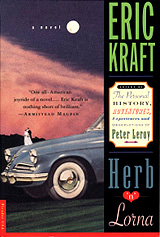
YOU CAN READ
THE FIRST HALF OF THE BOOK
HERE,
ONLINE, ONSCREEN,
OR
YOU CAN ORDER THE
PICADOR USA EDITION
AT
OR
BARNES&NOBLE.COM.
YOU CAN DOWNLOAD
THE COMPLETE TEXT
AS AN eBOOK
AND
READ IT IN BED.
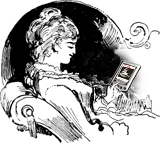
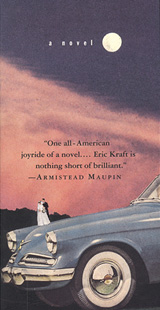
Take, for example, the morning when Ella seemed to wink at Herb. Herb rushed to work, practicing the story of her winking as he drove. He parked in the lot behind the showroom, and trotted toward the door. Hal Tripp saw him coming.
“Uh-oh,” he said, tapping Dick Barber on the shoulder, “here comes Herb, with that little grin on his face, and he’s talking to himself. You know what that means.”
“Yep,” said Dick, “he’s got a story about some damned cute thing Ella did.”
“What say we scoot out back and see how Old Randolph’s doing?” suggested Hal.
Herb came through the door exclaiming, “Wait till you hear this! She winked at me!” There was no response. No one was in the showroom. A Dictator, a Commander, and an Erskine sat there alone. Herb went to his desk, disappointed. He hung his coat and hat and stood for a while with his hands in his pockets.
“Old Randolph!” he said suddenly. He dashed out to the service area, where he found Old Randolph in the grease pit, under a Big Six. “Wait till you hear this!” he exclaimed. “She winked at me! Little Ella winked at me!”
“No kiddin’,” said Randolph.
“Nope, no kidding,” said Herb. “She was so cute! Lorna had just changed her, see, and she was lying on the rug in the dining room—Ella was—while I was drinking my coffee, and I looked down at her and I made that little sound out of the side of my mouth, the way you do with babies, chk-chk, like that, chk-chk, and she giggled the way she does when I do that, and then—she winked at me! Just like that! It was the damnedest thing I ever saw!”
From somewhere in the grease pit, but not from Old Randolph, came snickering. Curious, suspicious, Herb tiptoed around the Big Six. He found Hal and Dick huddled together, bent over, trying to keep from laughing aloud. Herb trudged off, his heart hardened.
In later years, whenever Herb began an anecdote of the small and personal variety, the kind that might be taken as insignificant, he would say, first, “You might want to slip off to the grease pit before I start this story.”
HERB SOLD quite a few Studebakers. The work he had put into making
himself known and respected began paying off. He began capitalizing
on the store of knowledge he’d accumulated about Babbingtonians.
He also had the Piper talent in such abundance that he became, in an important
sense, his own best customer. He sold himself on Studebaker, and
by studying the cars and the prospective buyers, he found pairings that
he sold himself on, too. His pitches rang true because he was convinced
that his pairings of prospects and cars were right. When a man or
woman or couple came into the showroom, chances were that Herb had already
picked a car for them, and when he described the satisfaction that someone
was going to get from, say, a Standard Six, it sounded like a fact, not
a prediction. Herb had another quality, one that struck everyone
but Herb himself as his strongest: he was a nice guy, the genuine article.
Some people bought a Studebaker from Herb rather than another car from
someone else just because they liked Herb and didn’t want to disappoint
him. Even May, who informed Herb when he first suggested he had a
car that might interest her, “In my family we have always owned Chryslers,”
eventually gave in and bought an Erskine roadster. (She refused to
abandon her loyalty to Chrysler entirely, however; she went on buying Chryslers
for as long as she went on buying cars. Herb suggested, often, that
she bought Chryslers just to get his goat. She would ask, “Is it
working?”)
When May’s Erskine arrived, Garth Castle delivered
it in person.
Oh, that was a day. That was a day. Herb telephoned to say that Garth was bringing the car over, and I thought that was a nice touch, but I asked Herb why he wasn’t going to bring it himself. Well, Herb was never particularly good at lying. He mumbled something I couldn’t make out, and I asked, “What?” and he said, “He wants to meet you.” Well. Garth was not the sort of man I would have had a chance to meet when my parents were alive, because he gave the impression of being terribly fast, and Auntie Phipps would certainly never have allowed a man like Garth to call on me. If she had her way I would never have met anyone who wore long pants. But here was an excuse, you see. Well, when I saw Garth come up the drive at the wheel of that adorable car, wearing that big grin of his, I fell in love. Head over heels. Just—wham!—like that.
